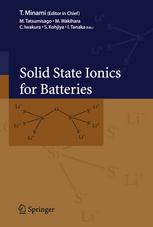

Most ebook files are in PDF format, so you can easily read them using various software such as Foxit Reader or directly on the Google Chrome browser.
Some ebook files are released by publishers in other formats such as .awz, .mobi, .epub, .fb2, etc. You may need to install specific software to read these formats on mobile/PC, such as Calibre.
Please read the tutorial at this link: https://ebookbell.com/faq
We offer FREE conversion to the popular formats you request; however, this may take some time. Therefore, right after payment, please email us, and we will try to provide the service as quickly as possible.
For some exceptional file formats or broken links (if any), please refrain from opening any disputes. Instead, email us first, and we will try to assist within a maximum of 6 hours.
EbookBell Team

4.8
44 reviewsIn this book, recent progress in batteries is firstly reviewed by researchers in three leading Japanese battery companies, SONY, Matsushita and Sanyo, and then the future problems in battery development are stated. Then, recent development of solid state ionics for batteries, including lithium ion battery, metal-hydride battery, and fuel cells, are reviewed. A battery comprises essentially three components: positive electrode, negative electrode, and electrolyte. Each component is discussed for the construction of all-solid-state Batteries. Theoretical understanding of properties of battery materials by using molecular orbital calculations is also introduced.